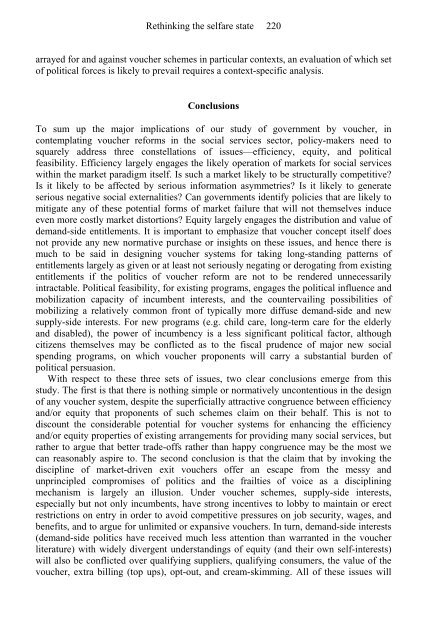Rethinking the Welfare State: The prospects for ... - e-Library
Rethinking the Welfare State: The prospects for ... - e-Library
Rethinking the Welfare State: The prospects for ... - e-Library
Create successful ePaper yourself
Turn your PDF publications into a flip-book with our unique Google optimized e-Paper software.
<strong>Rethinking</strong> <strong>the</strong> selfare state 220<br />
arrayed <strong>for</strong> and against voucher schemes in particular contexts, an evaluation of which set<br />
of political <strong>for</strong>ces is likely to prevail requires a context-specific analysis.<br />
Conclusions<br />
To sum up <strong>the</strong> major implications of our study of government by voucher, in<br />
contemplating voucher re<strong>for</strong>ms in <strong>the</strong> social services sector, policy-makers need to<br />
squarely address three constellations of issues—efficiency, equity, and political<br />
feasibility. Efficiency largely engages <strong>the</strong> likely operation of markets <strong>for</strong> social services<br />
within <strong>the</strong> market paradigm itself. Is such a market likely to be structurally competitive?<br />
Is it likely to be affected by serious in<strong>for</strong>mation asymmetries? Is it likely to generate<br />
serious negative social externalities? Can governments identify policies that are likely to<br />
mitigate any of <strong>the</strong>se potential <strong>for</strong>ms of market failure that will not <strong>the</strong>mselves induce<br />
even more costly market distortions? Equity largely engages <strong>the</strong> distribution and value of<br />
demand-side entitlements. It is important to emphasize that voucher concept itself does<br />
not provide any new normative purchase or insights on <strong>the</strong>se issues, and hence <strong>the</strong>re is<br />
much to be said in designing voucher systems <strong>for</strong> taking long-standing patterns of<br />
entitlements largely as given or at least not seriously negating or derogating from existing<br />
entitlements if <strong>the</strong> politics of voucher re<strong>for</strong>m are not to be rendered unnecessarily<br />
intractable. Political feasibility, <strong>for</strong> existing programs, engages <strong>the</strong> political influence and<br />
mobilization capacity of incumbent interests, and <strong>the</strong> countervailing possibilities of<br />
mobilizing a relatively common front of typically more diffuse demand-side and new<br />
supply-side interests. For new programs (e.g. child care, long-term care <strong>for</strong> <strong>the</strong> elderly<br />
and disabled), <strong>the</strong> power of incumbency is a less significant political factor, although<br />
citizens <strong>the</strong>mselves may be conflicted as to <strong>the</strong> fiscal prudence of major new social<br />
spending programs, on which voucher proponents will carry a substantial burden of<br />
political persuasion.<br />
With respect to <strong>the</strong>se three sets of issues, two clear conclusions emerge from this<br />
study. <strong>The</strong> first is that <strong>the</strong>re is nothing simple or normatively uncontentious in <strong>the</strong> design<br />
of any voucher system, despite <strong>the</strong> superficially attractive congruence between efficiency<br />
and/or equity that proponents of such schemes claim on <strong>the</strong>ir behalf. This is not to<br />
discount <strong>the</strong> considerable potential <strong>for</strong> voucher systems <strong>for</strong> enhancing <strong>the</strong> efficiency<br />
and/or equity properties of existing arrangements <strong>for</strong> providing many social services, but<br />
ra<strong>the</strong>r to argue that better trade-offs ra<strong>the</strong>r than happy congruence may be <strong>the</strong> most we<br />
can reasonably aspire to. <strong>The</strong> second conclusion is that <strong>the</strong> claim that by invoking <strong>the</strong><br />
discipline of market-driven exit vouchers offer an escape from <strong>the</strong> messy and<br />
unprincipled compromises of politics and <strong>the</strong> frailties of voice as a disciplining<br />
mechanism is largely an illusion. Under voucher schemes, supply-side interests,<br />
especially but not only incumbents, have strong incentives to lobby to maintain or erect<br />
restrictions on entry in order to avoid competitive pressures on job security, wages, and<br />
benefits, and to argue <strong>for</strong> unlimited or expansive vouchers. In turn, demand-side interests<br />
(demand-side politics have received much less attention than warranted in <strong>the</strong> voucher<br />
literature) with widely divergent understandings of equity (and <strong>the</strong>ir own self-interests)<br />
will also be conflicted over qualifying suppliers, qualifying consumers, <strong>the</strong> value of <strong>the</strong><br />
voucher, extra billing (top ups), opt-out, and cream-skimming. All of <strong>the</strong>se issues will


